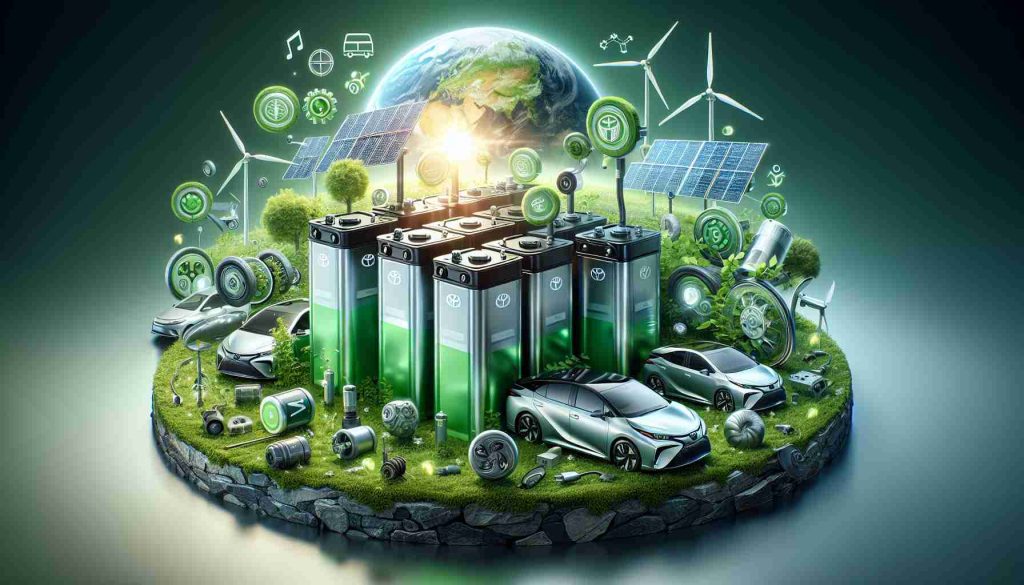
As traditional car manufacturers transition toward electric vehicles (EVs), Toyota stands out with its recent advancements in EV battery technologies. The automotive giant is aiming to transform the EV industry with their innovative batteries that promise to enhance vehicle performance, affordability, and user convenience. Toyota’s groundbreaking battery designs cover four new types, including a high-end solid-state battery, all with the goal of manufacturing 3.5 million EVs by 2030.
Their ‘Performance’ battery could allow vehicles to travel upwards of 497 miles on a single charge and offer recharging capabilities in under 20 minutes. The ‘Popularization’ battery is designed to be cost-effective while extending the driving range, making EVs more accessible to a broader market. The ‘High Performance’ battery further pushes the envelope with the potential to deliver a 621-mile range per charge.
Toyota is ambitiously planning to introduce its solid-state batteries to the market within the next five to six years, a move that could redefine vehicle charging times, on-road performance, and design standards.
**Summary:**
Toyota is at the forefront of the EV industry’s evolution, producing innovative battery technologies that could bolster the widespread adoption of electric vehicles. With new high-density batteries that reduce costs and cut charging times, Toyota is on track to become a leader in eco-friendly vehicle production by 2030.
**Industry Overview:**
The shift towards electric vehicles is accelerating amidst environmental concerns and consumer demand for sustainable transport options. However, the industry faces challenges in raw material supply, infrastructure development, and ensuring the environmentally conscious life cycle of EVs.
**Market Forecasts:**
Analysts predict a strong growth trajectory for the EV market, with Toyota’s developments potentially addressing the perennial issues of driving range and charging time.
**Industry and Product Issues:**
The sector must navigate material sourcing, battery recycling, and charging infrastructure development while balancing demand growth with sustainability.
**Conclusion:**
Toyota’s strategic battery technology advancements underline its commitment to environmental innovation. Their progress heralds a pivotal moment in the automotive industry’s journey towards sustainability and technological excellence, contributing to a greener and more sustainable future.
Industry Overview:
The global automotive sector is undergoing a radical transformation driven by the pursuit of sustainability and advances in technology. The electric vehicle market is a significant part of this shift away from fossil fuels toward cleaner energy sources. Pressure from governments, environmental organizations, and the broader public to reduce carbon emissions has led traditional car manufacturers to progressively pivot to EV production. Yet, the industry is not without its hurdles. Supply chain issues for raw materials such as lithium, cobalt, and rare earth elements are persisting obstacles. Furthermore, the development of supporting infrastructure, like widespread charging stations, and improvements in energy grid capacities are pivotal challenges that need substantial investment and innovation.
Market Forecasts:
According to industry analysts, the EV market is poised for exponential growth over the next decade. As battery technology evolves and economies of scale kick in, the cost of EVs is expected to decrease, making them more competitive with traditional internal combustion engine vehicles. Toyota’s advancements in battery technology could greatly enhance this growth, by overcoming barriers related to driving range anxiety and long charging times that have previously dampened consumer enthusiasm.
Industry and Product Issues:
While the EV industry is growing rapidly, it confronts numerous issues, particularly concerning environmental impact and sustainability practices. The extraction of essential raw materials often involves significant environmental disruption, and considerations on how to effectively recycle batteries at the end of their lifecycle are becoming increasingly important. Companies are pressured not only to innovate in terms of technical advancement but also to formulate strategies to deal with the resources they utilize efficiently and ethically.
Conclusion:
Toyota’s innovative approach to battery technology and their ambitious EV production targets affirm the company’s commitment to leading industry change. This not only represents a strategic move to position Toyota as a pioneer in the automotive sector but also contributes significantly toward a future where transportation is in harmony with the environment. As market adoption grows and Toyota’s advancements become a reality, the industry is set to make substantial strides in its journey towards sustainability and reduced ecological footprint.
To stay informed about Toyota’s moves within the EV landscape, you can visit Toyota’s official website.

Igor Nowacki is a fictional author known for his imaginative insights into futuristic technology and speculative science. His writings often explore the boundaries of reality, blending fact with fantasy to envision groundbreaking inventions. Nowacki’s work is celebrated for its creativity and ability to inspire readers to think beyond the limits of current technology, imagining a world where the impossible becomes possible. His articles are a blend of science fiction and visionary tech predictions.
